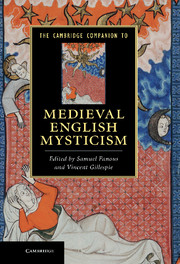Book contents
- Frontmatter
- Contents
- List of contributors
- Preface
- Chronology
- List of abbreviations
- 1 Introduction
- 2 c. 1080–1215: culture and history
- 3 c. 1080–1215: texts
- 4 1215–1349: culture and history
- 5 1215–1349: texts
- 6 1349–1412: culture and history
- 7 1349–1412: texts
- 8 1412–1534: culture and history
- 9 1412–1534: texts
- 10 1534–1550s: culture and history
- 11 1534–1550s: texts
- Guide to further reading
- Glossary of theological terms
- Index
- References
1 - Introduction
Published online by Cambridge University Press: 28 July 2011
- Frontmatter
- Contents
- List of contributors
- Preface
- Chronology
- List of abbreviations
- 1 Introduction
- 2 c. 1080–1215: culture and history
- 3 c. 1080–1215: texts
- 4 1215–1349: culture and history
- 5 1215–1349: texts
- 6 1349–1412: culture and history
- 7 1349–1412: texts
- 8 1412–1534: culture and history
- 9 1412–1534: texts
- 10 1534–1550s: culture and history
- 11 1534–1550s: texts
- Guide to further reading
- Glossary of theological terms
- Index
- References
Summary
Transcendent experience in history
This book is about an important body of writings, written or read in England between the Norman Conquest and the Reformation, which theorize, teach, or perform a personal address to, experience of, or relationship with God. The book's title refers to these works as mysticism, but this word defines only part of the book's scope. A fuller account requires several other keywords: devotional, affective, visionary, and most notably contemplative, used as the book's defining generic term, for reasons that will become clear. How we think of these keywords influences both the approach we take to the field and the writings we assume to define it.
Used together, mysticism and its companions draw attention to two features of the writings they describe. First, these writings are phenomenological, concerning individual felt experience in addition to systems of knowledge or belief. Second, they represent this experience as transcendent, involving an encounter – whether direct or mediated, transformatively powerful or paradoxically everyday – with God. The terms thus affirm a cosmology in which the idea of ‘transcendent experience’ is neither meaningless nor contradictory. In this cosmology, even though God is taken to exist beyond the order of creation, he is also accessible to it, even immanent within it, interacting with it directly and communicating with it, not only in formal and predictable ways – such as through religious rituals and the institutions that undergird them – but with apparent spontaneity and by way, at least on occasion, of mysteriously selected individuals.
- Type
- Chapter
- Information
- Publisher: Cambridge University PressPrint publication year: 2011
References
- 3
- Cited by

